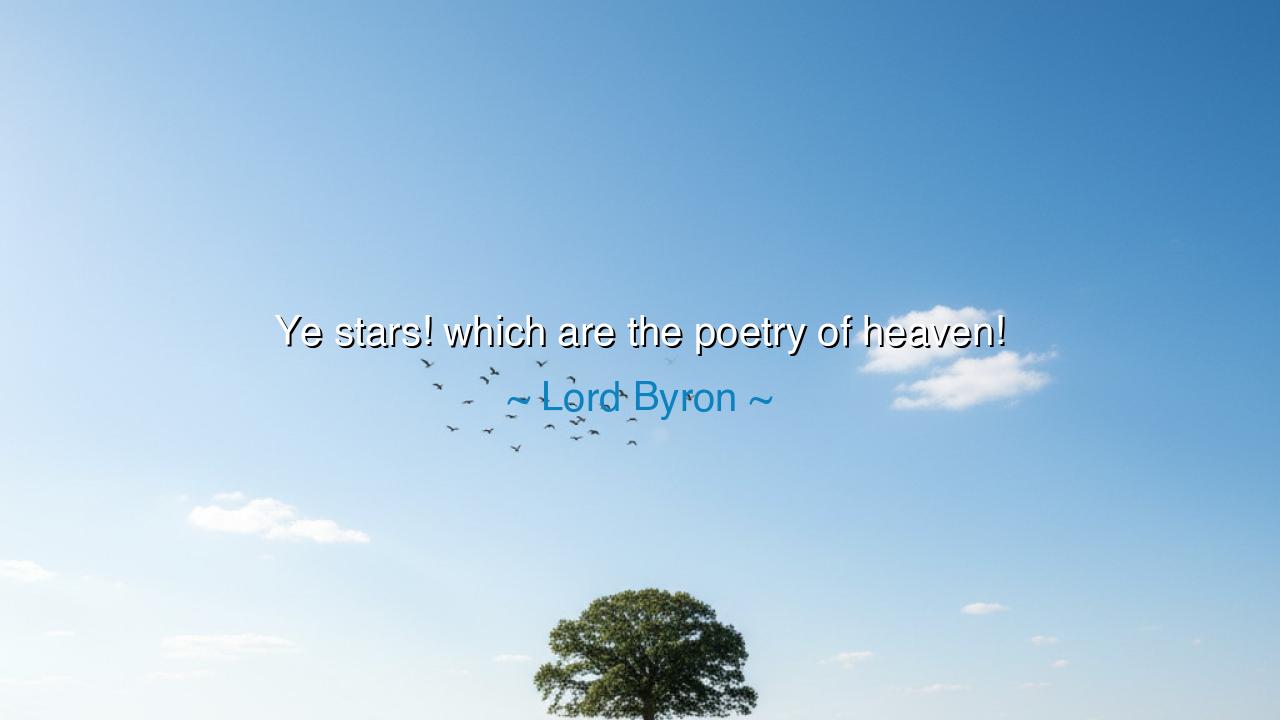
Ye stars! which are the poetry of heaven!






In the stillness of the night, when the world sleeps beneath the blanket of darkness, there is a symphony above, one composed of light and silence, a beauty that transcends time and space. Lord Byron, the poet whose words have endured across centuries, once gazed at the heavens and, filled with awe, declared: "Ye stars! which are the poetry of heaven!" In these words lies a deep truth—that the stars are not mere points of light in the sky, but the very language of the heavens, a divine form of expression, a celestial poem written across the vast canvas of the universe.
The stars, in their eternal dance, have captivated the hearts of all who have ever looked up in wonder. From the ancient civilizations, who saw in the stars the gods and myths of their time, to the poets and dreamers who found in their light the muse for their own creative works, the stars have always been a source of inspiration. The Greek philosophers and astronomers, such as Ptolemy and Aristotle, looked to the stars not just to map the heavens, but to find meaning in the patterns of the universe. To them, the stars were more than just distant bodies—they were signs, guiding lights that spoke of a greater order, a higher purpose.
Byron, in his poetic genius, saw the stars in much the same way, not as cold, distant objects, but as living expressions of the cosmos, each star a verse in the grand poem of the universe. What he meant by calling the stars the "poetry of heaven" is that they represent a language that the soul can understand—a language beyond the grasp of logic, one that speaks directly to the heart. The beauty of the stars is not just in their visual magnificence, but in their ability to stir something deep within us, to make us dream, to wonder, and to feel a part of something far greater than ourselves.
Consider, too, the story of the great explorers who set sail into the unknown, navigating by the stars. Christopher Columbus, in his quest to find a new world, relied on the stars to guide him across uncharted waters. The stars were not just markers in the sky; they were his companions, the silent, ever-present guides that led him toward a future he could not yet fully comprehend. Like Byron, Columbus saw in the stars a form of poetry—an expression of the universe that transcended the mundane and pointed toward something eternal.
Yet, even in the quietest moments of our lives, when the rush of the world fades away and we find ourselves alone in the night, we too are drawn to the stars. Whether it is in a quiet moment of reflection, in the search for meaning, or in the pursuit of wonder, the stars continue to be the poetry of heaven. They offer us not just beauty, but a connection to something greater—something that words alone cannot express. They remind us that we are part of a greater story, one that is written not in books, but in the very fabric of the universe.
Byron’s words invite us to look up, to seek the beauty that is ever present in the night sky, and to find in the stars not just a physical phenomenon, but a deeper, more spiritual connection. It is a call to recognize that the universe, though vast and incomprehensible, is also deeply personal—that even in the immensity of space, there is a poetry, a message, that speaks directly to our souls. In the stars, we find not just light, but meaning, not just beauty, but a deeper understanding of our place in the cosmos.
The lesson here, O children of the future, is this: as you journey through your lives, remember to look up. The stars are not just distant objects—they are the poetry of the heavens, the silent song that has been sung across time and space. When you seek meaning, when you search for guidance, when you feel lost in the vastness of existence, look to the stars. In their light, you will find not only beauty, but a reminder that we are part of something grand, something eternal, and something deeply connected to the heart of the universe. Let the poetry of the heavens guide you, just as it has guided the explorers and poets of ages past. And in that guidance, you will find the wisdom to navigate the mysteries of life itself.






AAdministratorAdministrator
Welcome, honored guests. Please leave a comment, we will respond soon